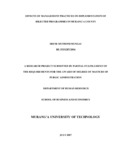| dc.description.abstract | Devolution is the decentralisation of power and resources that culminates in the formulation of sub national government units to improve efficiency, access and response to service delivery, promote participation and empowering local citizens to be more accountable. The success of any form of devolution is based on the programmes undertaken by the local governments; ownership of such programmes; efficiency in human resource management within the select programme; prudent financial management and cost control. Management practices largely affect programme implementation in a myriad way. Such management practices may include; public or community involvement, strategic choices on the management of financial resources and human resource management. While various scholars opined that low public confidence levels and lack of civic education hindered implementation of local programmes, management practises used in public participation, financial management and human resources management practises and their effect on programmes being implemented, had largely been unaddressed. In furtherance, the scope of the studies undertaken largely concentrated on various parts of the world thus the relationship between the variables of concern in this study had not been addressed within the scope of Murangá County. It is against this background that the study sought to analyse the effects of management practices on programme implementation in Murang’a County. The main objective of the study was to analyze the effects of management practices on programme implementation in Murang’a County. The specific objectives of the study were to establish the relationship between management practices and project implementation in Murangá County; to analyze the effects of public participation on programme implementation in Murangá County; to examine the effects of financial management on programme implementation in Murang’a County and to determine the effects of human resource management practices on programme implementation in Murang’a County. Three theories were reviewed: management by objective theory, control theory and goal setting theory and how they related to this study. Descriptive statistics design complemented with correlation research design was used in the study. A sample size of 150 respondents was stratified according to sub counties using the number of registered voters 579,218 to determine the proportions. The response rate was 80% hence reliability and validity of the study. The findings of the study revealed that 60.6% of the project implementation is explained by the effect of public participation, the financial management explains 44% of the project implementation. 87.2% of the county project implementation is explained by the human resource. While 44% of the project implementation is explained by the combination of all the above four factors. The study recommended that since the research covered one among the 47 county governments in Kenya, the study may not be a true representation of the status quo in other counties. Further, the research did not cover the entirety of programmes covered by the County government of Murang’a hence the need for furtherance of this research. | en_US |

